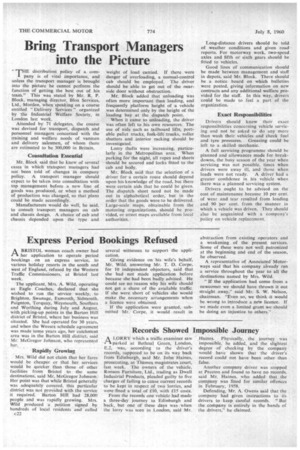Bring Transport Managers into the Picture
Page 58

If you've noticed an error in this article please click here to report it so we can fix it.
THE distribution policy of a company is of vital importance, and unless the transport manager is brought into the picture he cannot perform the function of getting the best out of his team." This was stated by Mr. R. P. Block, managing director, Blox Services, Ltd., Morden, when speaking on a course entitled "Delivery Services" organized by the Industrial Welfare Society, in London last week.
Attended by 71 delegates, the course was devised for transport, dispatch and personnel managers concerned with the training and welfare needs of vanmen and delivery salesmen, of whom there are estimated to be 300,000 in Britain.
Consultation Essential
Mr. Block said that he knew of several cases • in which transport managers had not been told of changes in company policy. A transport manager should expect to be taken into consultation with top management before a new line of goods was produced, or when a method of production was changed, so that plans could be made accordingly.
Manufacturers would do well, he said, to consult transport managers on cab and chassis design. A choice of cab and chassis depended upon the type and weight of load carried. If there were danger of overloading, a normal-control cab should be employed. The driver should be able to get out of the nearside door without obstruction.
Mr. Block added that unloading was often more important than loading, and frequently platform height of a vehicle was determined only by the height of the loading bay at the dispatch point.
When it came to unloading, the driver was often left to his own resources. The use of aids such as tailboard lifts, portable pallet trucks, fork-lift trucks, roller shutters and interior racking should be investigated, Lorry thefts were increasing, particularly in the Metropolitan area. When parking for the night, all ropes and sheets should be secured and locks 'fitted to the cab and body.
Mr. Block said that the selection of a driver for a certain route should depend upon his knowledge of the road, but there were certain aids that he could be given. The dispatch sheet need not be made out in alphabetical order, but in the order that the goods were to be delivered. Large-scale maps, obtainable from the motoring organizations, should be provided, or street maps available from local authorities. Long-distance drivers should be told of weather conditions and given road reports. For motorway work, two-speed axles and fifth or sixth gears should be fitted to vehicles.
Good lines of communication should be made between management and staff in depots, said Mr. Block. There should be a notice board on which bulletins were posted, giving information on new contracts and any additional welfare provided for the staff. In this way, drivers could be made to feel a part of the organization.
Exact Responsibilities
Drivers should know their exact responsibilities concerning vehicle servicing and not be asked to do any more than wash their vehicles and check fuel and tyre pressures. Greasing could be left to a skilled mechanic.
A full servicing programme should be planned and allowances made for breakdowns, the busy season of the year when servicing was not possible, times when drivers were away ill, and those when loads were not ready. A driver had a greater confidence in his vehicle when there was a planned servicing system.
Drivers ought to be advised on the cost of maintenance because 10 per cent. of wear and tear resulted from loading and 90 per cent, from the manner in which a vehicle was driven. They should also be acquainted with a company's policy on vehicle replacement.








































































































